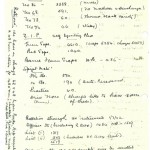The British launched a series of attacks on Rommel’s defences in the Western Desert this week, but in each case they were repulsed with heavy losses in men and tanks; with Rommel short of supplies the First Battle of El Alamein was heading towards a stalemate. In southern Russia German forces captured the city of Rostov-on-Don along with 240,000 prisoners. Also this week Germany opened the Treblinka extermination camp outside Warsaw.
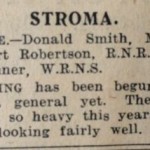 In Caithness summer was well advanced and some farmers had begun hay-cutting, but this
In Caithness summer was well advanced and some farmers had begun hay-cutting, but this 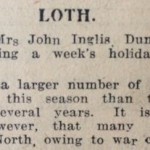 was not yet widespread. In Loth, the John O’Groat Journal reported that “there is a larger number of grouse on the moors this season than there has been for several years. It is not expected, however, that many sportsmen will come North, owing to war conditions.”
was not yet widespread. In Loth, the John O’Groat Journal reported that “there is a larger number of grouse on the moors this season than there has been for several years. It is not expected, however, that many sportsmen will come North, owing to war conditions.”
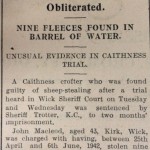 The main news in the John O’Groat Journal this week was that John Macleod, a crofter near Wick, had been convicted of sheep-stealing after nine fleeces were discovered in a water-barrel on his croft. Earlier in the summer 68 Cheviot ewe hoggs had been stolen from William Mackenzie of Castlehill, although 51 were later recovered. Acting
The main news in the John O’Groat Journal this week was that John Macleod, a crofter near Wick, had been convicted of sheep-stealing after nine fleeces were discovered in a water-barrel on his croft. Earlier in the summer 68 Cheviot ewe hoggs had been stolen from William Mackenzie of Castlehill, although 51 were later recovered. Acting 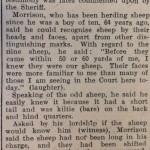 on information received, police searched Macleod’s croft and found nine of the missing sheep, which had been shorn, and the fleeces soaking in water (allegedly to remove the owner’s markings). The decisive testimony came from Mackenzie’s shepherd, John Morrison, who said, “Before they came within 50 or 60 yards of me I knew they were our sheep. Their faces were more familiar to me than many of those I am seeing in the Court here today (laughter).” Speaking of one sheep, “he easily knew it because it had a short tail and was kiltie (bare) on the back and hind quarters.”
on information received, police searched Macleod’s croft and found nine of the missing sheep, which had been shorn, and the fleeces soaking in water (allegedly to remove the owner’s markings). The decisive testimony came from Mackenzie’s shepherd, John Morrison, who said, “Before they came within 50 or 60 yards of me I knew they were our sheep. Their faces were more familiar to me than many of those I am seeing in the Court here today (laughter).” Speaking of one sheep, “he easily knew it because it had a short tail and was kiltie (bare) on the back and hind quarters.”
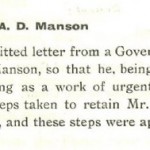 The Government had written to Wick Burgh’s Electricity Department, “pressing for the release of Mr Manson so that he, being a marine engineer, can be employed in shipbuilding as a work of urgent national importance.” The Manager of the Electricity Department was clearly unimpressed by the urgency, and the Council noted with approval that “steps [were being] taken to retain Mr Manson’s services.”
The Government had written to Wick Burgh’s Electricity Department, “pressing for the release of Mr Manson so that he, being a marine engineer, can be employed in shipbuilding as a work of urgent national importance.” The Manager of the Electricity Department was clearly unimpressed by the urgency, and the Council noted with approval that “steps [were being] taken to retain Mr Manson’s services.”
The John O’Groat Journal reported an “alarming accident” on Stroma Island. A young 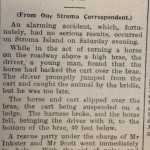 man, trying to turn a horse and cart above a high brae “found that he had backed the cart over the brae … The horse and cart slipped over the brae, the cart being suspended on a ledge. The harness broke, and the horse fell, bringing the driver with it, to the bottom of the brae, 40 feet below.” A rescue party with poles recovered the horse and driver; luckily both escaped with just a few minor injuries but were otherwise unharmed.
man, trying to turn a horse and cart above a high brae “found that he had backed the cart over the brae … The horse and cart slipped over the brae, the cart being suspended on a ledge. The harness broke, and the horse fell, bringing the driver with it, to the bottom of the brae, 40 feet below.” A rescue party with poles recovered the horse and driver; luckily both escaped with just a few minor injuries but were otherwise unharmed.

Finally this week, here is an inventory of the arms and ammunition of the Caithness Home Guard, which shows them to be very well equipped. This included 786 .300 rifles and 189,650 rounds of ammunition, as well as 120 shotguns and 7 revolvers (“private property”); 158 Sten submachine guns; and just under 4,000 grenades. The battalion strength consisted of 35 officers and 1,519 men. The inventory adds: “Approximately 120 conscripts will be enrolled during this month (July).”